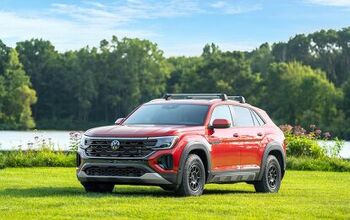CARB To Bump ZEV Mandate, Automakers Fight Back
The WSJ [sub] reports
California regulators want zero-emission vehicles—those that don’t run on petroleum—to comprise up to 5.5% of new-car sales in the state, or roughly 81,300, in 2018. The target would rise annually to 14%, or more than 227,600, by 2025…
Tom Cackette, chief deputy executive officer of the California Air Resources Board, says his agency’s goal is to test whether electric cars can become mainstream vehicles, or wind up serving a “niche” market. Mr. Cackette said the state is investing in charging stations and other infrastructure, and he pointed to the sales of new plug-ins on the market to show that there’s a demand for the vehicles. He said he believes the California targets are feasible.
“That is a question we’ll only find out by trying,” he said. “I think [car companies] are making a pretty big investment in these vehicles, and they wouldn’t be doing that if they didn’t think there was a market there.”
Industry lobby groups are pushing California to roll the ZEV mandate into the forthcoming national CAFE standard. Small automakers like Mazda complain that placing a California ZEV mandate on top of national emissions standards would create a “costly burden…in light of the uncertain marketplace and infrastructure for electric vehicles.” And since CARB is leading the federal government by the ear towards a national standard anyway, it could simply push for a higher CAFE rate, which would at least allow firms the flexibility to comply on their own terms. Adding a major ZEV mandate won’t fundamentally change the national standard, but it absolutely will force automakers to spend huge amounts of money to develop a kind of vehicle that has major shortcomings, is only as green as local electricity generation, and has yet to prove itself with consumers. Whatever you think of emissions standards increases, it should be clear that consumers should determine what mix of technologies can best serve their needs while lowering fuel consumption and pollution.
More by Edward Niedermeyer
Latest Car Reviews
Read moreLatest Product Reviews
Read moreRecent Comments
- Calrson Fan Jeff - Agree with what you said. I think currently an EV pick-up could work in a commercial/fleet application. As someone on this site stated, w/current tech. battery vehicles just do not scale well. EBFlex - No one wanted to hate the Cyber Truck more than me but I can't ignore all the new technology and innovative thinking that went into it. There is a lot I like about it. GM, Ford & Ram should incorporate some it's design cues into their ICE trucks.
- Michael S6 Very confusing if the move is permanent or temporary.
- Jrhurren Worked in Detroit 18 years, live 20 minutes away. Ren Cen is a gem, but a very terrible design inside. I’m surprised GM stuck it out as long as they did there.
- Carson D I thought that this was going to be a comparison of BFGoodrich's different truck tires.
- Tassos Jong-iL North Korea is saving pokemon cards and amibos to buy GM in 10 years, we hope.

































Comments
Join the conversation
California Air Resources Board released the original ZEV mandate around 1990. At the time, manufacturers were required to sell ZEV's representing 2% of their California sales. They had the same goal then as today, to push EV's. GM spent hundreds of $millions in good faith effort to develop the EV1 to comply with the law, despite the reality that battery technology was so poor. It is better, but still poor. Think of the Volt's current technology battery as a $10,000 fuel tank that holds the equivalent of about 1 gallon of gas and weighs 50 times as much! All car makers, notably Toyota and Honda, successfully lobbyied California to defer the implementation of the original ZEV requirement, screwing GM. Having had the opportunity to meet with the CARB regulators back then, I found their arrogance and demand that carmakers will "just have to figure out how to do it" to be astounding. Unelected bureaucrats are the bane of American society!
Ah yes, more mandating what people want and buy. Yeah, that's proven to be successful. Don't these eggheads have this backwards, I mean a manufacturer can't really force a certain percentage of people to buy something. "Hi, I want a 2011 Gas Guzzler SUV with a V12 engine and 35 inch tires" "Well, I need to sell you this electric car with a 31 HP 3 cylinder engine and 13 inch wheels. It's quite lovely" "I think I'll pass. How about a 700Hp corvette?" "Hmmm, we had 2 but they are gone. We've got lots of plug in cars, this one if fully charged" "Listen, if I wanted something charged up and ready to run, I'd ask your wife. I what a turbocharged direct injected 4X4" "Well sir, I have to direct you to the CA Department of Motor Vehicle Sales" "I'm outta here"